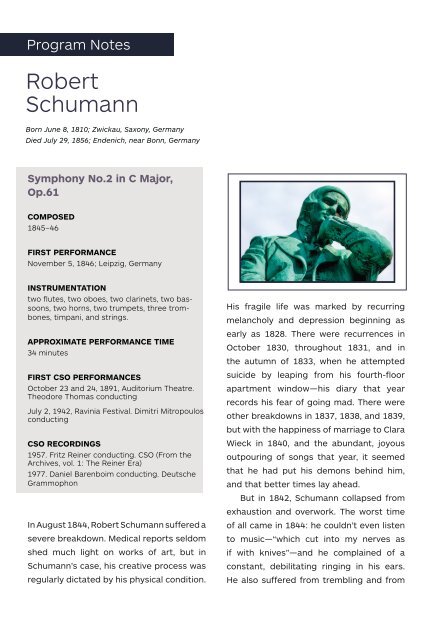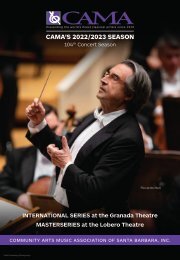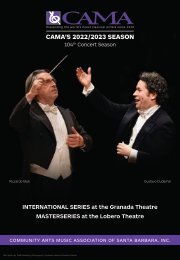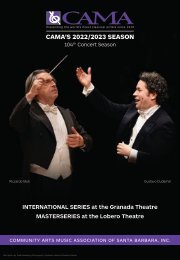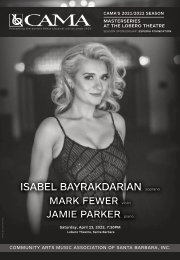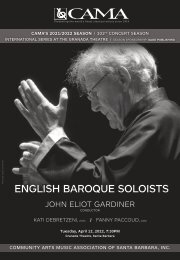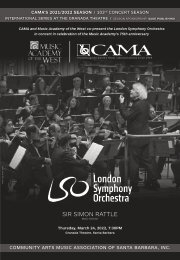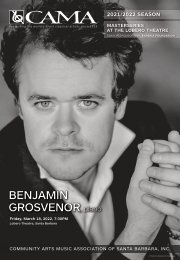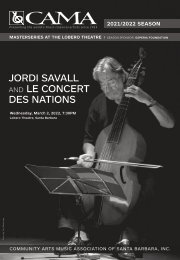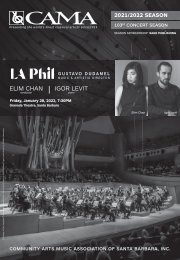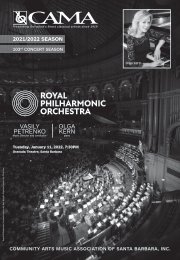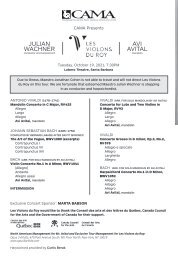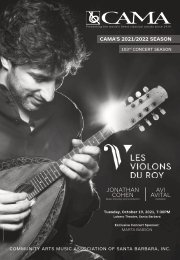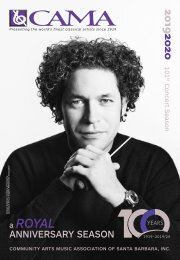CAMA presents Chicago Symphony Orchestra - October 21, 2017 - International Series at The Granada Theatre
Chicago Symphony Orchestra Saturday, October 21, 2017, The Granada Theatre, 8pm Riccardo Muti Music Director Stephen Williamson Clarinet Franz Schubert: Symphony No.8, D.759, “Unfinished” Wolfgang Amadeus Mozart: Clarinet Concerto in A Major, K.622 Robert Schumann: Symphony No.2 in C Major, Op.61 Not seen in Santa Barbara since 1987, the Chicago Symphony Orchestra is consistently hailed as one of the greatest orchestras in the world. In collaboration with the best conductors and guest artists on the international music scene, the CSO performs well over one hundred concerts each year at its downtown home, Symphony Center and at the Ravinia Festival on Chicago’s North Shore. Music lovers outside Chicago enjoy the sounds of the Chicago Symphony Orchestra through best-selling recordings and sold-out tour performances in the United States and around the globe. Maestro Riccardo Muti is one of the preeminent conductors of our day. In 2010, when he became the tenth music director of the Chicago Symphony Orchestra (CSO), he already had more than forty years of experience at the helm of the Maggio Musicale Fiorentino, Philharmonia Orchestra, Philadelphia Orchestra, and Teatro alla Scala.
Chicago Symphony Orchestra
Saturday, October 21, 2017, The Granada Theatre, 8pm
Riccardo Muti Music Director
Stephen Williamson Clarinet
Franz Schubert: Symphony No.8, D.759, “Unfinished”
Wolfgang Amadeus Mozart: Clarinet Concerto in A Major, K.622
Robert Schumann: Symphony No.2 in C Major, Op.61
Not seen in Santa Barbara since 1987, the Chicago Symphony Orchestra is consistently hailed as one of the greatest orchestras in the world. In collaboration with the best conductors and guest artists on the international music scene, the CSO performs well over one hundred concerts each year at its downtown home, Symphony Center and at the Ravinia Festival on Chicago’s North Shore. Music lovers outside Chicago enjoy the sounds of the Chicago Symphony Orchestra through best-selling recordings and sold-out tour performances in the United States and around the globe. Maestro Riccardo Muti is one of the preeminent conductors of our day. In 2010, when he became the tenth music director of the Chicago Symphony Orchestra (CSO), he already had more than forty years of experience at the helm of the Maggio Musicale Fiorentino, Philharmonia Orchestra, Philadelphia Orchestra, and Teatro alla Scala.
You also want an ePaper? Increase the reach of your titles
YUMPU automatically turns print PDFs into web optimized ePapers that Google loves.
Program Notes<br />
Robert<br />
Schumann<br />
Born June 8, 1810; Zwickau, Saxony, Germany<br />
Died July 29, 1856; Endenich, near Bonn, Germany<br />
<strong>Symphony</strong> No.2 in C Major,<br />
Op.61<br />
COMPOSED<br />
1845–46<br />
FIRST PERFORMANCE<br />
November 5, 1846; Leipzig, Germany<br />
INSTRUMENTATION<br />
two flutes, two oboes, two clarinets, two bassoons,<br />
two horns, two trumpets, three trombones,<br />
timpani, and strings.<br />
APPROXIMATE PERFORMANCE TIME<br />
34 minutes<br />
FIRST CSO PERFORMANCES<br />
<strong>October</strong> 23 and 24, 1891, Auditorium <strong>The</strong><strong>at</strong>re.<br />
<strong>The</strong>odore Thomas conducting<br />
July 2, 1942, Ravinia Festival. Dimitri Mitropoulos<br />
conducting<br />
CSO RECORDINGS<br />
1957. Fritz Reiner conducting. CSO (From the<br />
Archives, vol. 1: <strong>The</strong> Reiner Era)<br />
1977. Daniel Barenboim conducting. Deutsche<br />
Grammophon<br />
In August 1844, Robert Schumann suffered a<br />
severe breakdown. Medical reports seldom<br />
shed much light on works of art, but in<br />
Schumann’s case, his cre<strong>at</strong>ive process was<br />
regularly dict<strong>at</strong>ed by his physical condition.<br />
His fragile life was marked by recurring<br />
melancholy and depression beginning as<br />
early as 1828. <strong>The</strong>re were recurrences in<br />
<strong>October</strong> 1830, throughout 1831, and in<br />
the autumn of 1833, when he <strong>at</strong>tempted<br />
suicide by leaping from his fourth-floor<br />
apartment window—his diary th<strong>at</strong> year<br />
records his fear of going mad. <strong>The</strong>re were<br />
other breakdowns in 1837, 1838, and 1839,<br />
but with the happiness of marriage to Clara<br />
Wieck in 1840, and the abundant, joyous<br />
outpouring of songs th<strong>at</strong> year, it seemed<br />
th<strong>at</strong> he had put his demons behind him,<br />
and th<strong>at</strong> better times lay ahead.<br />
But in 1842, Schumann collapsed from<br />
exhaustion and overwork. <strong>The</strong> worst time<br />
of all came in 1844: he couldn’t even listen<br />
to music—“which cut into my nerves as<br />
if with knives”—and he complained of a<br />
constant, debilit<strong>at</strong>ing ringing in his ears.<br />
He also suffered from trembling and from


